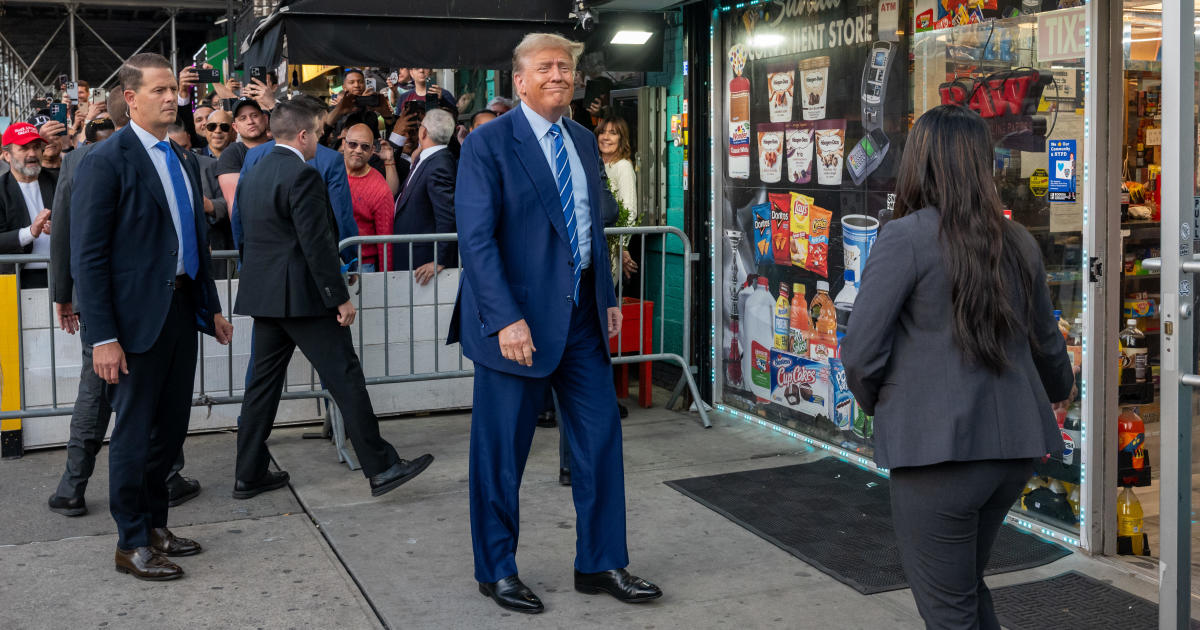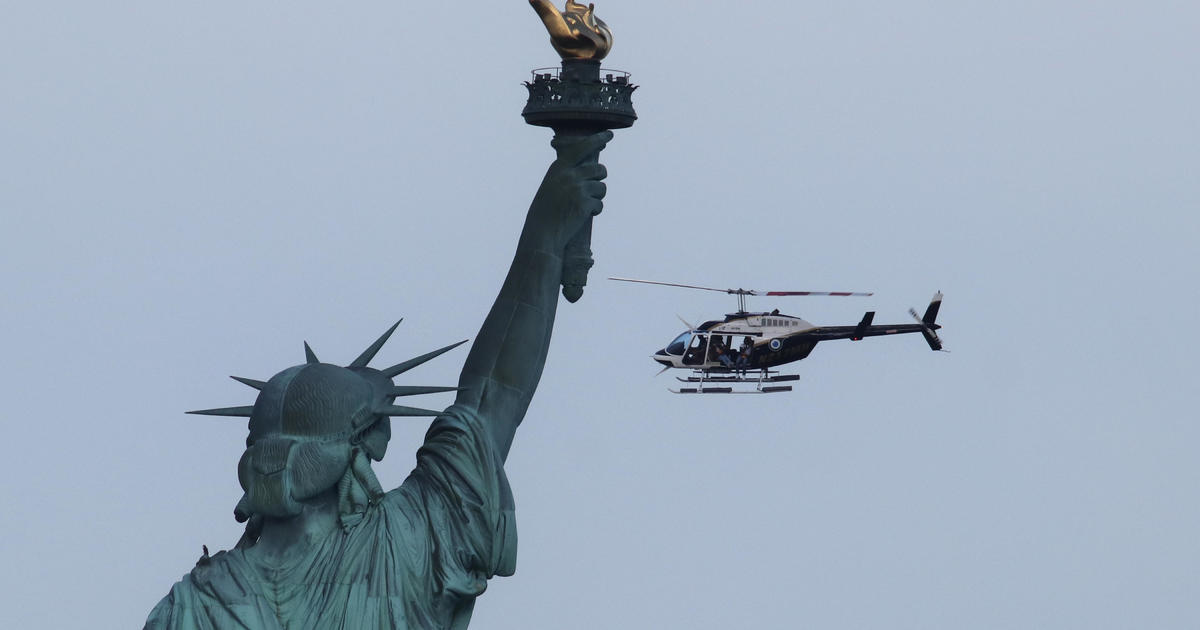Trump Defends Call To Ban Muslims At Debate; Cruz, Rubio Spar
LAS VEGAS (CBSNewYork/AP) -- Donald Trump defended his provocative call for banning Muslims at Tuesday night's Republican presidential debate.
Meanwhile, all the candidates pushed their own plans for fighting Islamic State militants. As CBS2's Tony Aiello reported, the heat was on among all the other candidates to put a dent in Trump's lead.
Sens. Marco Rubio and Ted Cruz clashed many times during the debate -- over government access to Americans' communications, among other issues.
From the start, the debate was dominated by national security, reflecting the reshaping of the 2016 contest by the recent attacks in Paris and San Bernardino, California. Hours before the debate began, officials in Los Angeles closed all schools after an emailed threat that was later deemed a hoax.
In their opening remarks at the debate, the candidates each stepped off by speaking on the theme of national security.
"We need a president who understands the first obligation of the commander in chief is to keep America safe. If I'm elected president, we will hunt down and kill the terrorists. We will utterly destroy ISIS," Cruz said.
Cruz also said the county would not take in "jihadists" as refugees.
Both Cruz and fellow candidate Ben Carson referenced "political correctness" as a problem holding the country back from dealing with terrorism and security threats.
Cruz later went on to accuse the Obama administration of ignoring warning signs from people who turned out to be terrorists – including San Bernardino shooter Tashfeen Malik and the Tsarnaev brothers in the 2013 Boston Marathon bombing – in the interest of "political correctness."
"Political correctness is killing people," Cruz said.
Meanwhile, Trump said his "total focus" had been building up the military and borders, but his focus had been on such countries as China, Japan and Mexico that he claimed were taking advantage of the U.S.
But now, terrorism has come into focus, and "We've opened up a very big discussion that needed to be opened up," Trump said.
Moderator Wolf Blitzer of CNN then asked Trump about his most controversial proposals – including banning all non-American Muslims from entering the country, refusing to allow Syrian refugees to enter, deporting all undocumented immigrants, and building a wall across the Mexican border. Blitzer asked whether the best way to "make America great again" was to isolate the country.
Trump said isolating the country was not his goal.
"We are not talking about isolation. We're taking about security. We're not talking about religion. We're talking about security," Trump said. "Our country is out of control."
Trump claimed that migrants from Syria included "tens of thousands of people with cellphones with ISIS flags on them."
"They're not coming to this country, and if President Obama has brought some to this country, they are leaving. They're going. They're gone."
Panelist Hugh Hewitt also asked Trump why he did not want to see Syrian President Bashar al-Assad removed from power – nothing that Assad is allied with Iran and other hostile powers.
"I think Assad is a bad guy – a very bad guy," Trump said. But he later added, "We have to do one thing at a time," and fighting ISIS must be the top priority.
Trump also spoke in favor of shutting down parts of the Internet as a national security measure.
"I would certainly be open to closing areas where we are at war with somebody," Trump said. "I sure as hell don't want people who want to kill us and kill our nation use our Internet."
Early on, former Florida Gov. Jeb Bush was quick to challenge Trump on some of his proposals, defending remarks that Trump was "unhinged."
"Donald is great at one-liners, but he's a chaos candidate," Bush said. "He would be a chaos president. He would not be the commander in chief we need to keep our country safe."
Trump responded: "Jeb doesn't really believe I'm unhinged. He said that very simply because he failed in his campaign. It's been a total disaster. No one cares."
But in another squabble with Trump, Bush said, "Donald, you're not going to be able to insult your way to the presidency."
Trump also slammed CNN as a host for the debate, complaining that Bush and other candidates were repeatedly asked questions that had to do with Trump's comments.
"I think it's very unprofessional," he said.
When Trump and Bush reached the point of talking over each other, Ohio Gov. John Kasich took them both to task.
"All the fighting and arguing is not advancing us. It is not the way we're going to strengthen our country," Kasich said.
Meanwhile, Kentucky Sen. Rand Paul went after Trump for his proposal to kill the families of terror suspects, saying it goes against the Constitution. Trump got defensive and was booed.
"They can kill us, but we can't kill them?" Trump says, arguing that was what Paul is saying, CBS News reported.
When the audience booed, Trump said, "These are people who want to kill us folks. And you're objecting to us infiltrating their conversation? I don't think so."
Early on in the debate, Cruz was asked whether he disagreed with Trump's proposals and why. He said he understood where Trump was coming from, and blamed any problems with the nation's security on President Barack Obama.
"Everyone understands why Donald has suggested what he has," Cruz said. "We're looking at a president who has engaged with this doublespeak."
Cruz complained that after the mass shooting in San Bernardino on Dec. 2 that left 14 people dead and 21 others injured, Obama focused on gun control – which Cruz characterized as an infringement on constitutional rights.
He also accused Obama of refusing to "call radical Islam by its name," and calling for the welcome of tens of thousands of refugees who cannot be vetted.
Trump repeated that he would consider Cruz as a running mate if he wins the Republican nomination.
"I've gotten to know him over the past three or four days. He was a wonderful temper. He's just fine, don't worry about it," Trump said.
Meanwhile, Cruz was asked point blank why he criticized Trump in public, but would not criticize him in public or during the debate. Cruz evaded the question.
"What I said in private is exactly what I'll say here, which is that the judgment that every voter is making on every one of us here is who has the experience, who has the vision, who has the judgment to be commander in chief," Cruz said.
He added that "all nine candidates up here would make an infinitely better commander in chief than Barack Obama or Hillary Clinton."
Rubio joined Cruz in saying he understood why Trump had raised the idea of restricting Muslims, and avoided directly criticizing the front-runner. But Cruz and Rubio traded their share of barbs with one another at the debate.
The two senators debated at length their differences over government surveillance programs. Rubio has accused Cruz of weakening the government's ability to track terrorists because he voted in favor of legislation to eliminate the National Security Agency's bulk phone-records collection program and replace it with a more restrictive effort to keep the records in phone companies' hands.
Rubio also said he understood why Trump had raised ideas about restricting Muslims, and avoided directly criticizing the front-runner.
Instead, the two senators debated at length their differences over government surveillance programs. Rubio has accused Cruz of weakening the government's ability to track terrorists because he voted in favor of legislation to eliminate the National Security Agency's bulk phone-records collection program and replace it with a more restrictive effort to keep the records in phone companies' hands.
Cruz insisted the new law gives the government more access to cellphones and other technology terrorists are more likely to use -- a contention Rubio disputed.
``There is nothing we are allowed to do under this bill that we were not allowed to do before,'' Rubio said.
Beginning after the Sept. 11, 2001, terror attacks, the NSA secretly collected the daily calling records - but not contents of conversations - for most Americans, including people never suspected of any crime.
A new law, called the USA Freedom Act, passed in June with broad, bipartisan support. It ordered the NSA to end bulk collection after a six-month transition that expired last week.
Rubio also took issue with Cruz's support of broad-based budget cuts, including a "containment budget" that would drastically reduce military spending. He said such cuts would hamper American attempts to fight ISIS.
Cruz and Rubio -- both Cuban-Americans in their 40s -- also clashed over whether the U.S. should seek to remove dictators in the Middle East, including Assad. Cruz argued that the governments that replace autocrats can often be worse than the ones opposed by the U.S., while Rubio said of Middle East dictators, ``If they go, I will not shed a tear.''
The senators also displayed differences in their strategies for targeting ISIS. Cruz called for using ``overwhelming air power'' to destroy the Islamic State, while Rubio said airstrikes would have to be supplemented by ground troops, including American special operations forces.
President Obama has largely relied on airstrikes to target the militants in Iraq and Syria. However, he's also sent troops to Iraq to help train and assist local forces and recently approved sending special operations forces into Syria.
For his part, New Jersey Gov. Chris Christie also took Obama, and Democratic presidential candidate Hillary Clinton, to task on issues of terrorism.
"It's the new normal under Barack Obama and Hillary Clinton," Christie said, claiming that with regard to ISIS, Clinton had said her strategy would be "just about the same as the president's."
When the issue turned to a potential no-fly zone being implemented in Syria, Christie made it clear that he was ready to do what was necessary to enforce that no-fly zone, as CBS Philadelphia reported.
The hypothetical, set up for the candidates to address, was how should a Russian violation of a no-fly zone be handled by the United States.
In his remark that slammed Obama, Christie responded, "Yes we would shoot down the planes of Russian pilots, if in fact they were stupid enough to think that this president was the same feckless weakling that the president we have in the Oval office is right now."
But Christie also blamed GOP lawmakers for contributing to dysfunction in Washington.
"If you listen to the folks up here, you'd think they weren't even there; that they had nothing to do with this. That's the difference between being a governor and a legislator," Christie said. "When something doesn't work in New Jersey they look at me."
Christie also defended his call to ban Syrian refugees – even orphans under the age of 5 – from entering the country. He said FBI Director James Comey had made clear that the refugees could not be adequately vetted, and thus, security concerns demanded that their entry be halted.
And Carly Fiorina said the country needs ``someone who's made tough calls in tough times'' as a commander-in-chief instead of first-term senators ``who never made executive decisions in their life.''
The former chief executive officer of Hewlett-Packard said talking tough is not the same as being strong.
She also said she wants to bring back a ``warrior class'' of generals, including David Petraeus and Stanley McChrystal, who she says retired early because they told President Obama things he didn't want to hear.
And Carson offered an air travel analogy to explain why he thinks the United States should focus on domestic needs.
Asked if the Middle East is better with dictators in charge, Carson said no one is better off with dictators, but the United States should ``start thinking about the needs of the American people.''
Carson likened the situation to putting on an oxygen mask on in a plane during an emergency, before helping a neighbor.
``The fact of the matter is the Middle East has been in turmoil for thousands of years,'' said the former pediatric neurosurgeon. ``For us to think that we're going to go in there and fix that with a couple of little bombs and a few little decorations is relatively foolish.''
Tuesday's debate was the first for Republicans in more than a month. The four previous GOP debates had record viewership, giving the candidates an unparalleled platform to reach voters.
With just six weeks until voting begins, the broad contours of the race remain consistent. Trump still sits atop the GOP field, displaying a talent for connecting with voters frustrated with Washington and on edge about the threat of terrorism.
A Monmouth University poll out Monday shows Trump with 41 percent of the Republican vote, 27 points ahead of Cruz.
But it was a different story in the key state of Iowa where Cruz is gaining ground against the billionaire businessman. A Quinnipiac poll out Monday shows Trump only 1 point ahead of Cruz among Iowa Republicans.
Political Scientist Dan Schnur said GOP leaders see Cruz as a threat.
"Because his conservatism is so far outside the political mainstream, it could cost the Republican party just as dearly in the general election as a Trump or Carson nomination could," Schnur said.
Cruz's rise in Iowa has been accompanied by a precipitous decline for Carson, the retired neurosurgeon who has struggled with inexperience on national security matters. Christie is enjoying increasing support in New Hampshire, which helped him regain his spot on the main debate stage after being downgraded in November.
Also on the main stage Tuesday night were former business executive Carly Fiorina and Ohio Gov. John Kasich.
Four lower-polling candidates appeared at an earlier event: former Arkansas Gov. Mike Huckabee, former Pennsylvania Sen. Rick Santorum, former New York Gov. George Pataki and South Carolina Sen. Lindsey Graham.
For struggling candidates, the debates will be one of their last opportunities to change the trajectory of their campaigns before voting begins in Iowa Feb. 1. The stakes are particularly high for Bush, who was once seen as a front-runner for the Republican nomination and has raised more money than any other candidate.
(TM and © Copyright 2015 CBS Radio Inc. and its relevant subsidiaries. CBS RADIO and EYE Logo TM and Copyright 2015 CBS Broadcasting Inc. Used under license. All Rights Reserved. This material may not be published, broadcast, rewritten, or redistributed. The Associated Press contributed to this report.)



